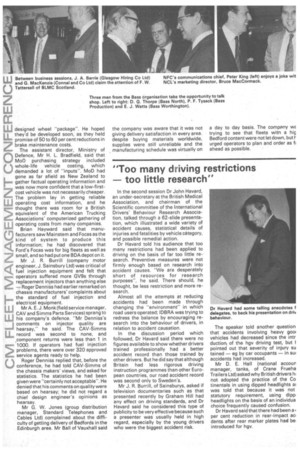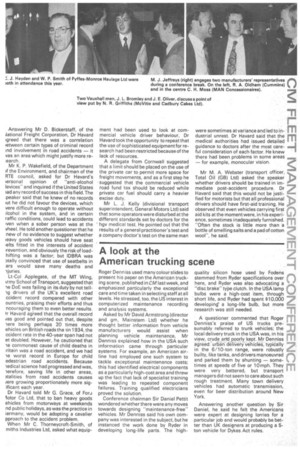"Too many driving restrictions too little research"
Page 66

Page 67

If you've noticed an error in this article please click here to report it so we can fix it.
In the second session Dr John Havard, an under-secretary at the British Medical Association, and chairman of the Scientific committee of the International Drivers' Behaviour Research Association, talked through a 62-slide presentation, which illustrated a wide variety of accident causes, statistical details of injuries and fatalities by vehicle category, and possible remedial action.
Dr Havard told his audience that too many restrictions had been applied to driving on the basis of far too little research. Preventive measures were not firmly enough based on research into accident causes. "We are desperately short of resources for research purposes", he said. There should, he thought, be less restriction and more research.
Almost all the attempts at reducing accidents had been made through changing the -environment" in which road users-operated; IDBRA was trying to redress the balance by encouraging research into the behaviour of drivers, in relation to accident causation.
In the discussion period which followed, Dr Havard said there were no figures available to show whether drivers trained professionally had a better accident record than those trained by other drivers. But he did say that although Britain had less rigorous driving instruction programmes than other European countries, our road accident record was second only to Sweden's.
Mr J. R. Burrill, of Sainsburys, asked if television documentaries such as that presented recently by Graham Hill had any effect on driving standards, and Dr Havard said he considered this type of publicity to be very effective because such a presenter was usually held in high regard, especially by the young drivers who were the biggest accident risk. The speaker told another question that accidents involving heavy gooi vehicles had decreased since the intr duction, of the hgv driving test, but I pointed out that severity of injury su tamed — eg by car occupants — in sui accidents had increased.
Mr D. E. Hall (national accoun manager, tanks, of Crane Frueha Trailers Ltd) asked why British drivers hi not adopted the practice of the Co tinentals in using dipped headlights ai was told that because it was not statutory requirement, using dipp, headlights on the basis of an individua choice frequently caused confusion.
Dr Havard said that there had been a per cent reduction in rear-impact aco dents after rear marker plates had be introduced for hgv.
Answering Mr D. Bickerstaff, of the Jational Freight Corporation, Dr Havard 'greed that there was a correlation ietween certain types of criminal record Ind involvement in road accidents — it vas an area which might justify more reearch.
Mr K. P. Wakefield, of the Department of the Environment, and chairman of the RTE council, asked for Dr Havard's iersonal opinion of "anti-alcohol. levices" and inquired if the United States oad any record of success in this field. The peaker said that he knew of no records lift he did not favour the devices, which vere difficult enough to operate without ilcohol in the system, and in certain raffic conditions, could lead to accidents ,yen when a sober person was at the vheel. He told another questioner that he new of no evidence to suggest whether ieavy goods vehicles should have seat pelts fitted in the interests of accident .revention, and obviously the risk of loadhifting was a factor; but IDBRA was otally convinced that use of seatbelts in ars would save many deaths and 'juries.
Lt-Col Applegate, of the MT Wing, kr my School of Transport, suggested that ie DoE was failing in its duty by not telllog drivers of the UK's excellent road ccident record compared with other ountries, praising their efforts and thus ncouraging them to even better results. or Havard agreed that the overall record as good and pointed out that, despite, 'ere being perhaps 20 times more ehicles on British roads tha iin 1934, the ccident rate in the 40-year span had not et doubled. However, he cautioned that le commonest cause of child deaths in ritain was a road accident, and we had le worst record in Europe for child edestrian road accidents. Because ledica I science had progressed and was, ierefore, saving life in other areas, 3talities from road accidents causes /ere growing proportionately more sigificant each year.
Dr Havard told Mr G. Grace, of ForJ olotor Co Ltd, that to ban heavy goods ehicles from motorways at weekends nd public holidays, as was the practice in iermany, would be adopting a cavalier pproach to the accident problem.
When Mr C. Thorneycroft-Smith, of miths.Industries Ltd, asked what equip ment had been used to look at commercial vehicle driver behaviour, Dr Havard took the opportunity to repeat that the use of sophisticated equipment for research had been restricted because of the lack of resources.
A delegate from Cornwall suggested that a limit should be placed on the use of the private car to permit more space for freight movements, and as a first step he suggested that the commercial vehicle road fund tax should be reduced while private car fuel should carry a heavier excise duty.
Mr L. J. Kelly (divisional transport superintendent, General Motors Ltd) said that some operators were disturbed at the different standards set by doctors for the hgv medical test. He pointed out that the results of a general practitioner's test and a company doctor's test on the same man
were sometimes at variance and led to inrn dustrial unrest. Dr Havard said that the medical authorities had issued detailed guidance to doctors after the most careful consideration of each factor. He knew there had been problems in some areas — for example, monocular vision.
Mr M. A. Webster (transport officer, Total Oil (GB) Ltd) asked the speaker whether drivers should be trained in immediate post-accident procedure. Dr Havard said that this would not be justified for motorists but that all professional drivers should have first-aid training. He observed that even vehicles carrying first aid kits at the moment were, in his experience, sometimes inadequately furnished. 9. "Often the stock is little more than a bottle of smelling salts and a pad of cotton wool", he said.




























































































































































